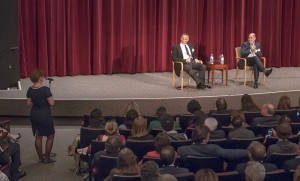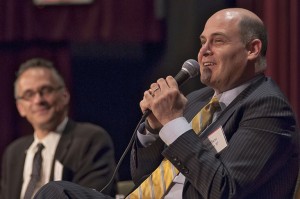This past weekend, the Board of Trustees was in town for its annual November meeting. Some trustees arrived Thursday to attend classes, and in the evening they met with a group of faculty over dinner to discuss skill building and career preparation. I had the pleasure of seeing a group of inspired students and Rinde Eckert in the Theater Department’s production of The Last Days of the Old Wild Boy. I went with Kari, who had been in conversation with Rinde about the human/animal distinction for the last several months. It was an extraordinary evening, the product of great teamwork, extensive preparation, and intense performance. I was so thankful to be there and to be part of a university where this kind of work takes place.
On Friday morning, a group of women on the faculty got together with the women on the Board of Trustees. I’m told that they had very productive conversations about the challenges facing women on our campus, and that they will continue to try to find ways to make our campus a place of true gender equality. During the day on Friday, trustees, along with faculty and student representatives to the Board, worked in committees on topics ranging from energy to the honor code, from fundraising for financial aid to the use of online courses to expand the reach of our educational mission. At the end of the afternoon, several board members met in an open meeting with a few dozen students to discuss financial aid. There were good questions raised, I thought, that clarified many of the issues we’ve been discussing since February. Over dinner that night, we celebrated newly elected trustees emeriti, and student, faculty and staff accomplishments. It was a joyful evening. Reading through the remarkable work that students were doing, I felt thankful that Wesleyan continues to attract and nurture such talent.
The Board concluded its work on Saturday, and we spent a good deal of time talking about the issues that had arisen at last week’s forum on diversity. We didn’t come up with a magical solution, but there was a commitment to continue to make our campus more inclusive. I headed to the gym with Sophie to get a little exercise, and then to watch the men’s basketball team (led by Derick Beresford ’13) win the Herb Kenny Tournament in convincing fashion. Dreisen Heath ’15 powered the women’s basketball team to a big win at St. Joseph’s tip-off tournament. The men host Williams tonight (Tuesday).
On Sunday evening, I was able to attend the first half of the African Students Association’s fall presentation. There were stirring performances of poetry, drumming, music and dance. I also learned a lot from the presentations. I left to attend the WSA meeting to go over our Board of Trustees discussions with the students gathered there for their weekly meeting. The student representatives spent hours (after I left) discussing key issues facing the university. We should all be thankful for their efforts.
My final meeting Sunday night was with more than 70 high school juniors and their alumni, staff and faculty parents, who are beginning the college search process. I could see the anxiety in some faces, and in some the hopeful anticipation of young people ready to begin a new stage in their lives. I extolled the virtues of liberal arts education today, and I emphasized that in our changing economy and culture this form of learning is more relevant than ever before. Looking around the room and thinking about my interaction with students over the last several days, I told the high school students that I hoped they would find a campus community where they were able to thrive, NOT because they were with people like themselves, but because they were in a diverse, dynamic and affectionate community from which they could learn. When they found such a community, I concluded, they would be very thankful. I know I am.
There will be plenty of work to do when we come back from break. For now, Happy Thanksgiving, Wesleyans!




